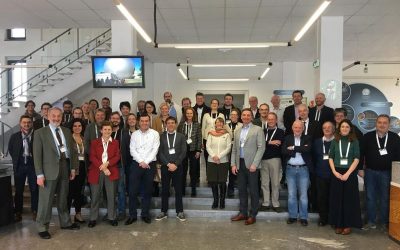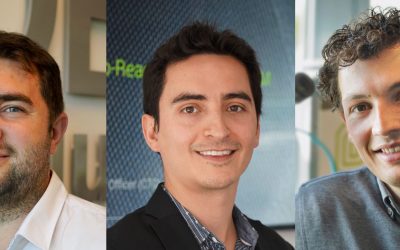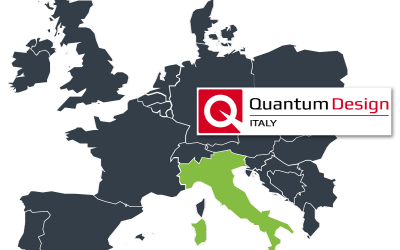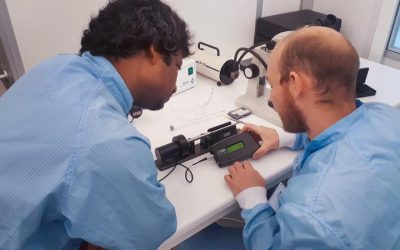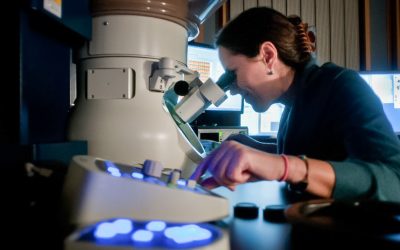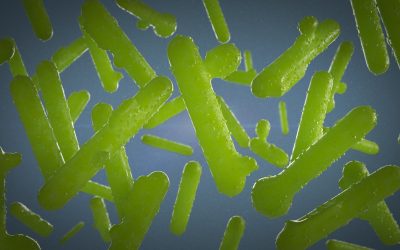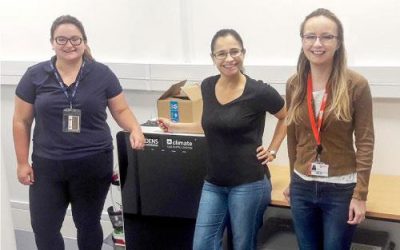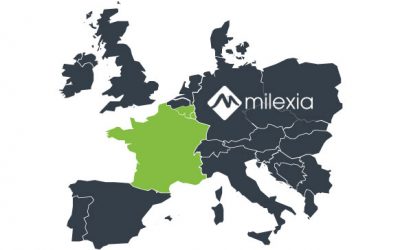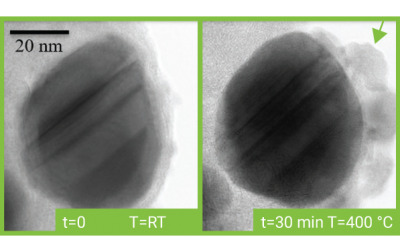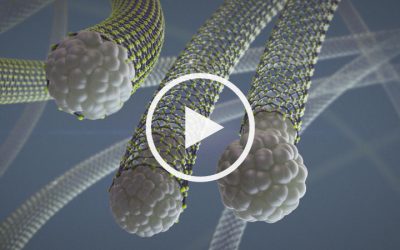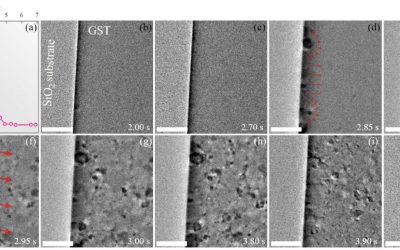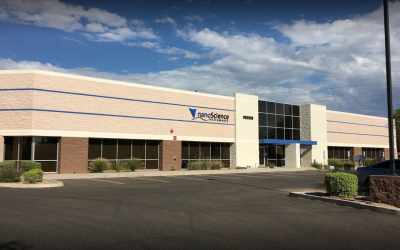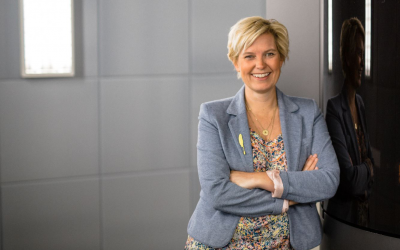News
Learn all about our latest Impulse release
DENSsolutions introduces the next generation of our Impulse In Situ TEM experiment control software. The Impulse 1.0 software release brings many new developments, like the Smart automation feature, that are there to make your research easier and enable you to produce reproducible results you can trust. Read all about it in the interview with our Product Architect (UX) Merijn Pen.
Operando TEM using Climate G+ to study Metal catalyst behavior during reaction
Using the DENSsolutions Climate system, scientists from National University of Singapore (NUS) showed that they were able to capture structural changes in Palladium (Pd) NPs during CO oxidation under realistic operating environments and correlate those changes with the NPs’ catalytic activity.
Izasa Scientific and DENSsolutions announce new partnership
DENSsolutions is proud to partner with Izasa Scientific to serve the Spanish and Portugese market. We have been active in Spain for a number of years and in those years we started to build a good relationship with the expert and passionate team of Izasa Scientific. Now we have recently officially signed our partnership, which we are sure will benefit the TEM community in Spain and Portugal. Offering them cutting-edge In Situ technology with the best possible local support.
In Situ helps to understand the recovery of deactivated palladium catalyst
Using the DENSsolutions Climate system, scientists from multiple Chinese institutes, among which DENSsolutions customer Tianjin University, further researched a method to recover or regenerate the activity of sintered and deactivated catalysts.
Improved FIB lamella preparation
DENSsolutions introduces the 3rd generation of the FIB stub which enables researchers to prepare a lamella and place it directly on the Nano-Chip, all inside the FIB. In this version, many improvements were made to make the FIB sample preparation easier, safer and quicker. Read the interview with Product Manager Dr. Yevheniy (Gin) Pivak who headed the development.
First Visualisation of Crystal Growth from Organic Molecules
Scientists characterise how flufenamic acid, a COX inhibitor, which is used in multiple industries, forms crystals from a liquid solution. The earliest stages of crystal growth are key to determining the final structure of a crystal, and scientists have visualised this process for the first time. Organic molecules were formed and grown in a liquid environment and characterised using the DENSsolutions Ocean In Situ system for Liquid Phase Electron Microscopy (LPEM).
Installing the first Climate system in Australia at the University of Sydney
Recently, we celebrated the installation of the first Climate G+ system ever in Australia. For this event we interviewed Dr. Bhatia. We discussed the research needs of his facility and how they will benefit from the solutions designed and manufactured by DENSsolutions.
1st Climate holder delivers new research results at FHI Berlin
Researchers at FHI Berlin produced excellent results with the DENSsolutions Climate holder, serial number #001. Demonstrating the stability of the Climate holder and Nano-Reactor and the compatibility with other techniques like SAED and Mass Spectroscopy.
The ESTEEM3 project: Enabling Science and Technology through European Electron Microscopy.
Since the beginning of the ESTEEM3 project, in January 2019, DENSsolutions has been involved as one of the industrial partners. Now, being in the 14th month of the project, we want to share some background of the project and see what has been achieved thus far. We interviewed Lucie Guilloteau who is the project manager of ESTEEM3.
Driving the field of LPEM forward at the Gordon conference
Last month, our Stream Product Manager Gin Pivak, CTO Hugo Perez Garza and Microsystems Engineer Tijn van Omme visited the Gordon Research Conference (GRC) on Liquid Phase Electron Microscopy (LPEM). They were there to inform the LPEM community about our Stream system which allows researchers to introduce an accurate and controlled liquid environment combined with in-situ heating or biasing possibilities.
Quantum Design Italy and DENSsolutions announce new partnership
DENSsolutions is proud to partner with Quantum Design Italy to serve the Italian market. Quantum Design has been one of the leading European distributors of high-tech instrumentation for scientific, academic and industrial research for over 45 years. DENSsolutions will strengthen their TEM portfolio with innovative MEMS based In Situ solutions and together we can build and strengthen relationships with research groups in Italy.
In situ heating TEM speeds up the characterisation process for Aluminium alloys exposed to in-service conditions
There is a big opportunity for the design and development of sustainable catalysts for low-temperature NOx removal in the steel, cement and glass industries. Researchers Dr. Yong Wang et al. from Zhejiang University made a recent breakthrough using critical information obtained by In Situ TEM to design a MnOx/CeO2 nanorod (NR) catalyst with outstanding resistance to SO2 deactivation.
Uppsala University in Sweden expands its TEM capabilities using DENSsolutions In Situ systems
A DENSsolutions Wildfire double tilt (DT) system with a biasing expansion has been installed at the Uppsala University, Sweden. The Wildfire DT system will be used by the group to research the phase transitions in metals and in solar cells.
Interview with Prof. Angus Kirkland, Science Director at the new Rosalind Franklin Institute, UK
We interviewed Prof. Angus Kirkland, Professor at the Department of Materials, University of Oxford and the science director at the Electron Physical Science Imaging Centre (EPSIC), Diamond Light Source UK. We talked about the new Rosalind Franklin Institute where he performs disruptive research projects in life sciences involving physical science methods, techniques, and instruments including In Situ TEM and correlative imaging.
Interview with Prof. María Varela del Arco, GFMC, Complutense University of Madrid
We interviewed Prof. María Varela del Arco, who is in charge of electron microscopy in the group GFMC at the Complutense University of Madrid. We talked about her research on, among other topics, magnetic materials and supercapacitors made possible by the DENSsolutions Lightning system.
Improved insight into catalytic reduction of NOx for industrial processes
There is a big opportunity for the design and development of sustainable catalysts for low-temperature NOx removal in the steel, cement and glass industries. Researchers Dr. Yong Wang et al. from Zhejiang University made a recent breakthrough using critical information obtained by In Situ TEM to design a MnOx/CeO2 nanorod (NR) catalyst with outstanding resistance to SO2 deactivation.
Queen’s University Belfast joins the group of Climate In Situ users
At the beginning of October, DENSsolutions installed a Climate G+ system at the Queen’s University Belfast, Northern Ireland, UK. The G+ is DENSsolutions’ most elaborate Climate system which allows researchers to perform In Situ Gas & Heating experiments with the option to flow mixed gases and switch between gases almost instantly.
Our partnership with the EPSRC/Jeol Centre for Liquid Phase Electron Microscopy at UCL, London
DENSsolutions LPEM systems enable advances in Life Science. Investigating soft matter polymer assemblies and dynamic behaviour of proteins in liquid. In this article, we take a look at the LPEM research that Ruiz-Perez is doing within the Molecular Bionics lab.
Milexia France SAS and DENSsolutions announce new partnership
DENSsolutions is proud to partner with Milexia France SAS to serve the French, Luxembourg and Wallonian market in Europe. The Milexia France SAS Scientific Instrumentation Division has been a vendor of high-tech scientific instruments since 1981. They offer expert advice, comprehensive solutions, installation and technical testing on-site. DENSsolutions will strengthen their TEM portfolio and together we can build new relationships with French-speaking research groups.
Giant Enhancement in the Supercapacitance of NiFe–Graphene Nanocomposites Induced by a Magnetic Field
The development of supercapacitors holds great promise for future energy storage devices with a high cyclability and durability which can be used in our homes, cars and mobile phones to support the transition to sustainable energy. Even though a lot of effort has been devoted to improving the energy and power densities by optimizing the internal configuration of the capacitor, there is still room for further improvement. Now, researchers..
Visualizing the dynamic behaviours during carbon nanotube growth in extensive detail
Carbon nanotubes (CNTs) hold many promises, for example in energy storage, high-performance catalysis, photovoltaics, and biomedical devices and implants. Using the Climate in situ TEM gas and heating system researchers were able to reveal the influence of pressure and temperature on the growth behaviors of carbon nanotubes at relevant conditions.
In-situ observation of Ge2Sb2Te5 crystallization at the passivated interface
In this work the DENSsolutions in situ TEM Lightning system has been employed to study the temperature induced nucleation behavior in Ge2Se2Te5 samples In Situ. This material is used as Phase Change Memory (PCM) and the knowledge of the amorphous-to-crystallize transition and the crystallization behavior is essential to its application, especially in nanometer or sub-nanometer modern and future electronics.
Converting CO2 into a valuable energy carrier using a model In2O3 catalyst
New discoveries made possible by In Situ TEM gas and heating. The direct hydrogenation of CO2 to methanol shows promise to be an important technique to reduce the amount of greenhouse gases in the atmosphere and thereby mitigate the negative effects of climate change while producing an important energy carrier. In his contribution to this article, Dr. Xing Huang has used In Situ TEM techniques to assess the limits of In2O3 catalytic performance in CO2 hydrogenation.
Interview with Prof. Rafal Dunin-Borkowski, Director of Ernst Ruska-Centre for Microscopy and Spectroscopy with Electrons in Jülich
We interviewed Prof. Rafal Dunin-Borkowski, Director of Ernst Ruska-Centre (ER-C) for Microscopy and Spectroscopy with Electrons in Forschungszentrum Jülich, Germany. We talked about his road to ER-C, his research into more energy-efficient electronic devices, the growing importance of software and data analysis and the need for automation to improve the measurement of weak signals.
Real‐Time Imaging of Nanoscale Redox Reactions over Bimetallic Nanoparticles
This recent article from National University of Singapore about the catalyst activity of bimetallic nanoparticles clearly demonstrates the versatility of the Climate G+ gas & heating system that was used for the in situ TEM experiments.
Nanoscience Instruments and DENSsolutions announce new partnership
DENSsolutions is proud to partner with Nanoscience Instruments to serve the US and Canadian markets. Nanoscience Instruments combines expertise in microscopy and...
Interview with Prof. Sara Bals, head of EMAT Antwerp
We interviewed Sara Bals, head of the Electron Microscopy group at the University of Antwerp (EMAT). We talked about her passion for electron microscopy, her team and the importance of tomography when creating 3D images that reveal the real structures of nanoparticles and clusters. This technique can lead to the development of novel materials and improvements in application fields such as catalysts.








